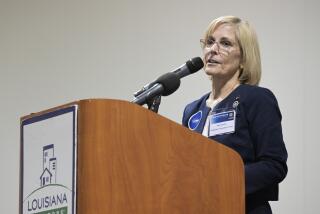GOP Apparently Captures Governorship of Alabama
- Share via
WASHINGTON — Republican Guy Hunt, a 53-year-old farmer and part-time preacher from the backwater town of Holly Pond, Ala., was projected the winner of the bitter Alabama gubernatorial race Tuesday night as the GOP reaped an unexpected windfall in its effort to permanently establish a two-party system in the South.
A little more than an hour after the polls closed, the Associated Press declared Hunt the victor over Democratic Lt. Gov. Bill Baxley. All three major television networks projected Hunt the winner shortly after balloting ended across the state, based on returns from sample precincts and on interviews with voters leaving the polls.
With 16% of the state’s vote counted, Hunt led Baxley, who was making a second unsuccessful bid for governor, 53% to 47%. Hunt would be the first Republican chief executive in the one-time capital of the old Confederacy in 112 years, his election ending the long era in which George C. Wallace dominated the state’s politics.
In New York, the networks quickly projected that Gov. Mario M. Cuomo was the winner of a second term in Albany, an outcome conceded by the GOP, which made Westchester County executive Andrew O’Rourke its nominee against one of the presumed contenders for the 1988 Democratic presidential nomination. Democratic strategists watched the outcome for the magnitude of Cuomo’s popular vote.
Other winners projected by the networks immediately after polls closed across the country Tuesday evening were incumbent Democratic Govs. Michael S. Dukakis of Massachusetts, James J. Blanchard of Michigan, William A. O’Neill of Connecticut, Joe Frank Harris of Georgia and Bill Clinton of Arkansas. Blanchard was turning back a strong challenge by William Lucas, a black former Democrat, whose much publicized political conversion had made him a highly visible candidate.
While Republican convert Lucas apparently was losing in Michigan, another former Democrat apparently was carrying the GOP banner to victory in Florida, one of the crucial states for both parties. Former Tampa Mayor Bob Martinez, a Democrat until three years ago, was projected by ABC as the winner over former Democratic legislator Steve Pajcic in the race to succeed Democratic Gov. Bob Graham. Republican incumbents John H. Sununu of New Hampshire and Edward DiPrete of Rhode Island were projected to win their races.
As widely expected, former Baltimore Mayor William Donald Schafer was projected by the networks to win the Maryland governorship over Thomas Mooney, a member of the Maryland Legislature, another former Democrat who switched parties last year.
Bitter Democratic Fight
As the 1986 campaign got under way, the Alabama governorship had not even been among the GOP’s prime targets, but the Democratic primary turned into a bitter, name-calling fight between Baxley and state Atty. Gen. Charles Graddick.
The fight dragged on in legal disputes in the courts through the summer and fall, and Hunt, who won 26% of the vote when he was the 1978 Republican nominee against Democrat Fob James, was the beneficiary.
Graddick, after apparently winning the Democratic nomination, was denied it on grounds that Republicans had illegally voted in the Alabama Democratic primary. He subsequently started a write-in campaign but dropped it last week.
36 Governor Races
With 36 governorships at stake, 19 were open by virtue of retirement or state laws preventing the incumbent from seeking another term, and 15 of them are being vacated by Democrats. The Democrats went into Tuesday’s election conceding that the GOP would pick up some seats but contending that the Republicans would remain short of a national majority.
Despite Republican efforts to “nationalize” the gubernatorial races by making them the second phase of the “Reagan Revolution,” the gubernatorial campaigns were fought with scant attention to national issues, without any dominant political theme and without the kind of urgency generated by the struggle for control of the Senate.
Ordinarily, the party in power can look forward to nothing but losses in mid-term elections, but, in the gubernatorial contests, the GOP opportunity to reverse that trend came from the large number of governorships being vacated by Democratic incumbents and the personal popularity of the party’s venerable national leader. The situation was the opposite of the Senate races, in which more Republican incumbents faced reelection challenges.
Toss-ups in 16 Contests
As the polls opened, Chuck Dolan, the executive director of the Democratic Governors’ Assn., said contests in 16 states were regarded as “toss-ups.” But he said “absolutely everything would have to break for the Republicans everywhere for them to pick up 10 states” and gain a majority of the governor’s offices in the country for the first time since 1970. The battleground came down to strong Reagan territory in the South and the West, and especially to nip-and-tuck races in Alabama, Florida, Oklahoma and South Carolina, where governors’ offices were being vacated by Democrats and polls have shown the GOP candidates within reach.
Republican chances to capture the Oklahoma governor’s race rode with the comeback of former Gov. and Sen. Henry L. Bellmon, who retired to his farm eight years ago but returned to win 70% of the vote in this year’s Republican primary. He was opposed by state Human Services Commission Chairman David Walters.
South Carolina saw a bitter, near-even race between Republican Rep. Carroll Campbell and Democratic Lt. Gov. Mike Daniel. Substantive differences between the two have not been marked, and Daniel tried through the campaign to portray himself as the candidate best prepared to carry on the programs of the popular outgoing Gov. Richard W. Riley.
Closely Watched Elections
Watched just as intensely as the Southern governorships being yielded by Democrats were races in Tennessee and Texas.
In Tennessee, former Republican Gov. Winfield C. Dunn and long-time House Speaker Ned Ray McWherter were in another near-even contest. The governorship is being given up by two-term Republican Gov. Lamar Alexander, and Dunn was bidding to become the first Republican governor elected to succeed another Republican in the South.
The bitter Texas campaign, sparked by the disastrous collapse of the state’s oil economy, pitted incumbent Democrat Mark White against former Gov. Bill Clements.
More to Read
Get the L.A. Times Politics newsletter
Deeply reported insights into legislation, politics and policy from Sacramento, Washington and beyond. In your inbox twice per week.
You may occasionally receive promotional content from the Los Angeles Times.










